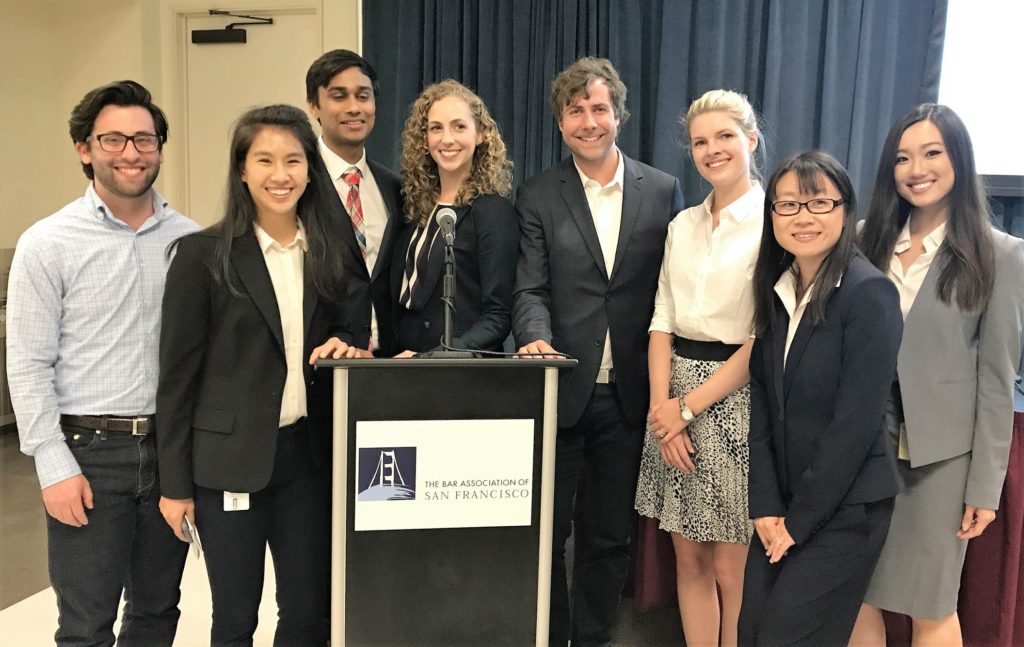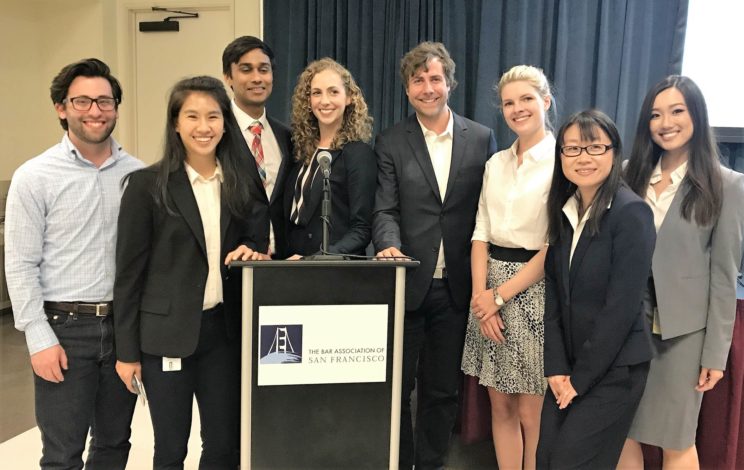In June, BASF’s Intellectual Property Section hosted the first Summer of IP, featuring summer associates speaking on unfolding intellectual property issues. Each summer associate developed their presentation with an experienced attorney and presented their findings to a packed house at BASF’s offices.

Meghan Fenzel, Berkeley ’18, Fenwick & West, discussed Threats to the Communications Decency Act § 230.
Section 230 immunizes online publishers from most liability arising from hosting others’ content; e.g., Twitter is immune from liability for users’ defamation. Many credit Section 230 with the internet’s growth and fear limitations will stifle free expression. Some, however, propose restricting Section 230 for specific offenses or even for state crimes generally, risking a chilling effect. Courts have also limited Section 230, holding it does not immunize against liability for failure to warn or failure to verify that content complies with local regulations. The California Court of Appeal affirmed an injunction ordering nonparty Yelp to remove an unfavorable review following default judgment against a user. Ms. Fenzel urged the audience to defend the protections for free speech enshrined in Section 230 and to be aware of these new risks when counseling online publishers.
Adi Kamdar, Harvard ’18, Fenwick & West, spoke about The Growing Perilousness of DMCA Safe Harbors.
Mr. Kamdar focused on a recent Ninth Circuit decision, Mavrix Photographs v. LiveJournal, where a celebrity photography company sued a social network for copyright infringement after discovering several of its photographs posted online. Normally, intermediaries like LiveJournal can take steps to qualify for safe harbor protections under the Digital Millennium Copyright Act (DMCA), curbing copyright suits arising from material posted by users. The Ninth Circuit, however, questioned whether the photographs on LiveJournal were really posted at the direction of a user if a moderator first had to approve their publication. This decision adds confusion to an already-complex copyright law, creates a circuit split, and seems to run contrary to Congress’s intent in creating the DMCA’s safe harbors.
Patrick Nack-Lehman, Santa Clara ’18, O’Melveny & Myers, discussed the Supreme Court’s recent decision defining patent exhaustion’s outer limits, Impression Products v. Lexmark, 137 S.Ct. 1523 (2017).
Federal Circuit precedent established that foreign sales do not exhaust U.S. patent rights and that post-sale restrictions are enforceable by patent infringement lawsuits. Lexmark abrogated this precedent, holding that exhaustion occurs with every authorized sale. The Court rationalized its decision with reference to common-law distaste for restraints on alienation and its recent copyright case, Kirtsaeng v. John Wiley & Sons, 568 U.S. 519 (2013). The Lexmark decision could profoundly impact companies that sell patented goods subject to rights restrictions and international pricing schemes. Mr. Nack-Lehman discussed contracts, pricing, technology and licensing as potential solutions to the exhaustion problem, with specific focus on the difficulties that companies, consumers, and courts may face if licenses replace sales.
Annie Lee, Berkeley ’19, O’Melveny & Myers, discussed a recent N.D. Cal. opinion in a copyright infringement case involving crowd-sourced videogames, Blizzard v. Lilith, 3:15-cv-04084.
The asserted copyrighted works—versions of Defense of the Ancients (“DotA”)—were created by a combination of efforts from the online community, then transferred to the plaintiffs by certain lead developers. The defendants alleged that the plaintiffs must prove their rights to the specific portions of the games alleged to be copied. Judge Breyer held that this was unnecessary because 1) each version of each game, or “mod’, was a unitary work, rather than a joint work; and 2) the lead developer, or “mastermind”, of each mod was the author of the work, entitled to assert copyright infringement of the entire mod. Ms. Lee discussed remaining uncertainties for individual contributors and a renewed need for rights defined by contract in crowd-sourced projects.
Valerie Truong, Berkeley ’18, Sidley Austin, discussed the Implications of the Supreme Court’s TC Heartland Decision that changed where proper venue lies for patent infringement suits against domestic corporations.
Previously, patent suits could be brought in any district where the defendant was subject to personal jurisdiction. After TC Heartland, patent suits can only be brought where the defendant is incorporated, or where the defendant has committed the alleged acts of infringement and has a regular and established place of business. Ms. Truong highlighted the limitations on forum shopping and significant changes in the geographical landscape of patent litigation, in which the concentration of patent cases in the Eastern District of Texas will shift to Delaware and California. Moving forward, courts will have to tackle the unanswered questions of the decision’s effect on declaratory actions, foreign corporations, and what it means to have a regular and established place of business.
Brittany Bruns, Berkeley ’18, and John Polansky, Stanford, ’18, both of Latham & Watkins, discussed district court applications of the Defend Trade Secrets Act’s ex parte seizure provision.
The ex parte seizure provision allows a court to seize “property necessary to prevent the propagation or dissemination of the trade secret.” This controversial remedy is only available in “extraordinary circumstances.” Mrs. Bruns and Mr. Polansky discussed several federal courts’ orders considering motions for ex parte seizure. Mrs. Bruns discussed a single published order granting an ex parte seizure and the unusual circumstances warranting it. She additionally noted that at least one court had granted a motion under seal, and there may be additional sealed orders. Mr. Polansky discussed five published orders denying ex parte seizures. In nearly all of the orders, the courts were unconvinced that ordinary equitable relief would be inadequate to protect the trade secrets.
Yuqing Cui, Harvard ’19, Morrison & Foerster, discussed a recent Federal Circuit opinion addressing whether the post-America Invents Act (AIA) definition of prior art requires public disclosure of the details of an invention in order to trigger the on-sale bar.
Ms. Cui reviewed the types of sale (public/secret and informing/non-informing), and the pre-AIA case law deciding which types of sale constituted prior art that would invalidate a patent. The AIA added the catch-all clause “or otherwise available to the public” to § 102 which contains “on sale” as one category of prior art. The Federal Circuit in Helsinn Healthcare S.A. v. Teva Pharmaceuticals USA, Inc., Nos. 2016-1284, 2016-1787 (Fed. Cir. May 1, 2017) held that Congress did not intend to change the meaning of “on sale” through its revision. Thus, a public sale still triggers the on-sale bar even if it does not disclose details of the invention.
BASF IP ExComm members Melody Drummond Hansen, Ash Nagdev, Gabe Gross, Diana Kruze, and Jennifer Schmidt worked tirelessly to make the first Summer of IP successful and fun. We plan to have more Summer of IP events next year.




